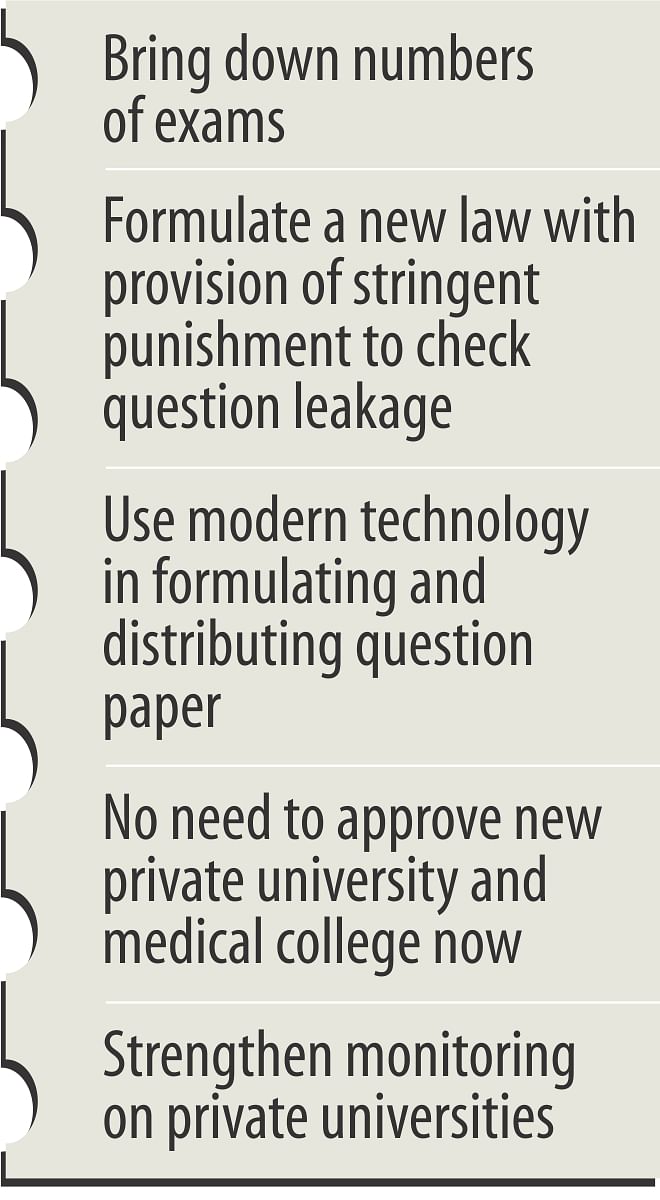Education system riddled with flaws

Pass rates in public examinations are on the rise every year but the quality of education is still in question, leading academics and educationists said yesterday.
The exams and evaluation systems at primary and secondary levels are flawed, and those should be reformed immediately, they said at a meeting with Education Minister Nurul Islam Nahid at his ministry.
Voicing concern over recent leaks of question papers in public exams, they demanded the government formulate a new law with a provision for stringent punishment to the culprits.
Some of them recommended reducing the number of exams, especially at primary levels, scrapping the class-VIII public exam, and instructing examiners not to be too generous in marking papers.
The meeting that was off limits to journalists discussed issues, including problems at private universities and medical colleges, efficiency of teachers and the education budget.
"The main goal of exams is to filter out ... What is the need for an exam if everybody passes it," Prof Abdullah Abu Sayeed, founder and chief executive of Bishwo Shahitto Kendro, told The Daily Star coming out of the meeting.
"I told the meeting that the exam or filtering system has to be more stringent. Only then, the quality of our education will improve."
Referring to the increasing number of GPA-5 holders in SSC and HSC exams, he said it will create a “crowd”.
"The standard of 80 percent of the GPA-5 holders is equal to that of second division holders in our time. The criteria [for getting GPA-5] should be harder," he said.
Noted artist Prof Hashem Khan said children are getting an exam-centred education, which is an obstacle to enhancing their creative and rational thinking.
 "There should not be any exams until class-V so that the students can study with joy and the fear of exams doesn't grow in them. The students should sit for an exam at class-V," he said.
"There should not be any exams until class-V so that the students can study with joy and the fear of exams doesn't grow in them. The students should sit for an exam at class-V," he said.
Prof Emeritus Anisuzzaman said they discussed ways on how to stop leaks of question papers. The application of information technology has to be increased in the preparation and distribution of question papers, he suggested.
Noted author and educationist Prof Muhammad Zafar Iqbal said, "I pointed out that there is no law for punishing the culprits for question paper leaks. The minister said the issue will be incorporated in the proposed Education Act before it is passed in parliament."
The minister also assured the educationists that steps would be taken to prevent question leaks by using modern technology, he said.
Author and litterateur Selina Hossain said there should be a strict monitoring system regarding the preparation and distribution of question papers.
Prof Shamsuzzaman Khan, director general of Bangla Academy, said the government should strengthen its monitoring on private universities, many of which are just handing out certificates in exchange for money.
Prof Pran Gopal Datta, vice chancellor of Bangabandhu Sheikh Mujib Medical University, said the government should not give approval to any more private university or medical colleges.
"There is no discipline whatsoever in private medical colleges … no patients are admitted there," he said.
Rasheda K Choudhury, executive director of Campaign for Popular Education, said, "The government should sit with stakeholders before bringing any changes in the exam system. We should also consider whether the grading system is applicable in our country."
She said they stressed the need for increasing budgetary allocations at primary and tertiary levels.
After the meeting, the education minister said, "The country's education system has gone far quantitatively over the last five years. Now, we have to ensure quality education."
On leaks of question papers, Nahid said a law is already in force to prevent it. "We can incorporate the provisions of the law in the Education Act. If necessary, a new law can be formulated."
Prof Salahuddin Ahmed, Prof Zillur Rahman Siddique, Prof Rehman Sobhan, Prof Rafiqul Islam, Prof Abdul Mannan, Prof Syed Manzoorul Islam, Prof Nazrul Islam, Prof Mustafa Nurul Islam, Mustafa Monwar, Prof MM Akash and Prof Muntassir Mamoon were also present at the meeting.

 For all latest news, follow The Daily Star's Google News channel.
For all latest news, follow The Daily Star's Google News channel. 



Comments